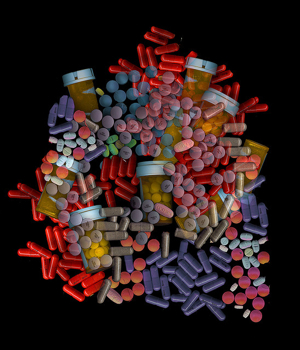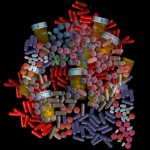If you’re depressed, you will get a prescription for an antidepressant, sooner or later. In fact, medication is likely to be the first treatment you receive, perhaps the only one. Most people are fine with that. They want to feel better fast, and medication seems like the best route.
Primary care physicians and psychiatrists prescribe them as a matter of course. Websites for the Mayo Clinic, Stanford, the National Institute for Mental Health and almost every online source of health information assure you that antidepressants are safe and effective.
However, there are dissenting voices, and they’re telling us more and more disturbing things: Antidepressants are no better than placebo, have dangerous side effects, don’t prevent relapse, may inflict long-term harm, are prescribed unnecessarily due to the influence of drug companies, and on and on. There are fierce debates over every aspect of the use, development, testing and effects of these drugs.
It’s easy to get confused by all the noise, but I find a lot to be concerned about. I’ll be writing a series of posts that ask some hard questions. To begin with, here are three:
- Why can it take so long to find an antidepressant that works?
- Why don’t antidepressants prevent relapse?
- Why are antidepressants the primary treatment?
1. Why can it take so long to find an antidepressant that works?
I’ve tried several medications for treating high blood pressure. Some had side effects I couldn’t put up with, and it took a while to find one that did its job without causing other problems. Despite the issue of side effects, every one of the drugs I tried did lower my blood pressure.
I realize that depression is an especially complicated illness that isn’t easy to treat. But given all the fanfare and assurances about antidepressants, I was expecting something similar to my experience with high blood pressure medication. Each one would be able to reduce my symptoms, but it would take time to screen out the drugs with unacceptable side effects.
If only that had been true. Instead, I went through about 20 medications over a 12-year period before finding one that worked for more than a few weeks.
You may be lucky. You may be among the 1 in 3 who feel a lot better after your first antidepressant treatment, or the 1 in 2 who recover after two medication tries. You may be one of those who doesn’t relapse after a few months. There are millions who experience these good things.
But there are millions who don’t. That’s what confuses me. My experience may be extreme, but I know I’m not alone in following the endless trail of antidepressants. After a while, the process of drug selection becomes pure trial and error.
The available drugs target different neurotransmitters, and the ones I took covered the lot. They targeted serotonin alone, serotonin and norepinephrine, norepinephrine and dopamine, dopamine alone, or all of them at once. At times, I used single drugs in increasing doses to reach maximum effect and, when one drug was insufficient, used a combination of antidepressants. These were mostly the newer generation of drugs, such as Prozac, Effexor, Wellbutrin and Zoloft.
The one that finally proved effective, for about 18 months, was Emsam. This is a patch version of selegiline, one of the older class of drugs known as Monoamine Oxidase Inhibitors (MOAI). They are used only as a last resort because they require dietary restrictions in order to avoid serious side effects.
However, Emsam eventually lost its effectiveness, and so lamotrigine was added. This is a mood stabilizer, rather than antidepressant, and is most often used to treat bipolar illness. This is the combination I still take. It has had far more benefit than any other medication I’ve taken in the preceding 12+ years.
Perhaps, I’m an especially tough case. I’ve got all the risk factors and fit all the profiles for severe recurrent depression that is resistant to most treatments. But let’s leave my experience out of the picture and focus on all those who get much faster relief than I did. How long do antidepressants keep them symptom-free?
2. Why don’t antidepressants prevent relapse?
Unfortunately, most people who do recover within a few months or a year will also relapse within a few months or a year.
The STAR*D study was the largest ever done on the effectiveness of antidepressants in achieving complete remission of symptoms. Full recovery is the result that you and I are looking for, but most of the antidepressant trials used to win federal approval for new drugs rely on a standard of response, meaning reduction of some symptoms but not all. Using the stricter standard of remission instead of response is one of the things that set this study apart from the rest.
STAR*D followed participants through as many as four phases of treatment, using different medications in each one. The study found that the likelihood of recovery sharply decreased the more phases participants had to go through.
About half achieved remission of symptoms after the first two phases. By the third and fourth phases, the number of participants had declined to a tiny fraction of the 3000 they started with. Among those, only about 12-14% recovered.
The study authors reported that after the four phases 70% had reached remission. That percentage is now widely used by authoritative online health sites and sounds encouraging. But this figure results from comparing the remitted participants with the total of those who stayed in the study. More than a third dropped out, many because they got no relief or couldn’t stand the side effects, yet their experience wasn’t accounted for.
I’m no expert, but I have to wonder if this method is the best one to use. If you compare the actual number who recovered with the number who entered the first round of treatment, the recovery rate is about 48%. What’s the best way to assess the outcome?
A lot of commenters have raised this question, but I’m even more interested in how long recovery lasts. According to S. Nassir Ghaemi, a prominent psychiatrist and author of Mood Disorders: A Practical Guide, only 25% of participants who achieved remission during the first two phases of the study stayed well after 12 months. In other words, the relapse rate was 75%.
Aside from the 25% who had recovered in a sustained way, the rest either had only a partial response, got well initially but then relapsed after a short time or received no benefit at all
This is the largest and one of the most authoritative studies ever done on antidepressant effectiveness, and the results look pretty disappointing to me.
3. Why are antidepressants the primary treatment?
If you look online to learn about the causes of depression, you’re likely to find a discussion of multiple factors. Genetics, family history, early childhood trauma, social stressors, psychological risk factors, brain structures and neurobiology. No single cause has been identified, but there appears to be a complex interaction of a great many influences. The model of this interplay is often called the bio-psycho-social model of depression.
The biological factors include far more than the action of a few neurotransmitters. They cover a crowded interaction of many systems in the brain. A 2009 review of neurobiological mechanisms in major depressive disorder summarizes several of these systems and criticizes the attempt to explain depression as the result of depletion of serotonin.
The review identifies the strong influence of genetic variations, the stress response system, the size of the hippocampus and other brain structures. It also describes the role of the growth factor related to formation of brain cells, brain activation patterns and the role of the neurotransmitter messengers. Without the further influence of genetics and psychosocial events, however, biological changes alone won’t necessarily result in the mood disorder.
All these factors play a role, and research on both causes and more effective antidepressants are moving forward at a rapid pace. The problem is that what you hear from drug companies and other sources – quite possibly also from your doctor – still emphasize the effectiveness of a class of drugs that address only a small part of the problem.
So I’m confused. If serotonin isn’t the major problem, then why are serotonin-related drugs used as the primary treatment for an illness that has much more complicated causes?
I realize that a great many psychiatrists and psychologists do their best to emphasize the breadth of treatment options that should come into play when treating depression. Highly respected professionals, like John Grohol at PsychCentral and Ronald Pies at Psychiatric Times, deride the myth of chemical imbalance as the cause of depression. The treatment guidelines of the American Psychiatric Association describe a lengthy and varied course of treatment adapted to individual needs.
But in the real world of 15-minute diagnosis and treatment by prescription, antidepressants are the rule. Psychotherapy is a runner-up that many patients never have a chance to receive. As Dr. Ghaemi says in one article, “A consequence of this rush to use antidepressants has been a coarsening of the nature of psychiatric practice.”
I’m not opposed to the use of antidepressants. It took a long time, but I have benefited from at least one that I still take. My approach is pragmatic. If something works, go for it.
Given my experience, however, I don’t look to drugs for full recovery. At their best, they’ve have kept symptoms in check so that I could work in a sustained way to achieve a rewarding life free of depression.
What has your experience been like with antidepressants?
Image by psyberartist at Flickr




When one has a story of anxiety that leads to depression, a little bit of OCD as well, then pills can be fantastic because it “teaches” the brain to go into pathways that you NEVER knew existed for your thoughts. Not even how hard I tried with therapy and good will, some ideas were for me “reality” and I couln’t see them differently. The pill- zolof/celexa suddenly changed my thought PATHWAYS in ways I would have never thought possible inside my head. So please do not confuse cases and individual cases and do not generalize them. If you have bipolar illness then you may need something to treat it as a whole, not just the depression part but that is up to the doctor to know- if possible see someone who specializes in YOUR specific brain “system”, not just someone more general,
good luck to you an ddon’t discourage others please
Hi, careful –
I understand your concern about the possible effect on others of these posts on antidepressants. But I’ve tried to avoid that quite carefully by not making general assertions. The post is written as questions, not as a lecture. These are perfectly valid concerns of mine and need to be expressed, especially since they are shared by others. I posed them after consulting current research. Many psychiatrists have worried about the fact that antidepressants often don’t work. The relapse rate after drug treatment is extremely high, and several therapies have been developed specifically to deal with this problem. Remember that I am talking about antidepressants and depressive disorders, not OCD or bipolar, which are very different conditions. There is not so much agreement as you suggest about the specific brain systems relating to depression. It’s an area of ongoing research. I know how passionate the debate about psychotropic medications is, but as I plead in another of these posts, there ought to be room for honest questioning by those of us who have not been helped by medications, even after years and years of using them. It’s wonderful when they work and turn a life around completely. It simply doesn’t happen for everyone.
John
Hi, John. I think my experience with antidepressants has been very similar to yours. I tried several of them in the early years, including an MAOI, and have been on Wellbutrin now for longer than I can remember, with a rare increase in dosage if symptoms become more acute. Not quite two years ago, I was on Lexapro for about a year because the top dosage of Wellbutrin wasn’t doing the trick, but I didn’t like the way it kind of numbed me out, so I stopped it after being more stable for a while.
I look at medication now as something that has helped me do whatever else I’ve needed to do to overcome the chronicity of depression, a large part of that being therapy – most recently, EMDR, which has seemed to me to make a lot of sense in light of having PTSD. It gets me to places I’d never go otherwise and it’s not something to go into lightly. I doubt if my therapist would even work with this if my depression wasn’t under control. It does feel to me like the symptoms are more manageable now and I’m thinking about experimenting with decreasing my dosage and perhaps even stopping it at some point – of course, I would make this decision with my doctor.
My ideas about managing depression now tend to be more in the vein of learning what triggers it and figuring out how to stop it before it gets out of control. There are triggers almost every day, so I know that if I don’t change my environment (emotionally), things stay the same. I guess you could compare it to someone going through chemical dependency rehab and then returning to the same environment to live, such as friends or family interactions. You can’t expect to sustain recovery without making some changes. I think it’s too bad that antidepressants are the very first thing considered for treatment. Yeah, they might work more quickly in the beginning, but they’re no real cure. I would certainly credit therapy far more than medications in my recovery. I’ve been fortunate to have good insurance coverage most of the time and even when it wasn’t, I just felt I had to make it a priority and figure out a way to afford it.
Interesting that you should broach a subject I happen to be reading about elsewhere. I’m reading “Anatomy of an Epidemic” (2010) by Robert Whitaker. It’s central tenet is that people would recover better if they did NOT use an antidepressant and just stuck it out. It cites studies that reveal there is no chemical imbalance in people who never took meds for depression, that the imbalance is the result of these meds. And that the meds often incite mania that was never present before the meds were taken. I know my first manic episode closely followed my first encounter with an antidepressant, Tofranil, a tricyclic. And I have gone through a manic cycle three times since, once for 4 years running. Which doesn’t prove Whitaker’s theory, but it sure makes me stand back and take a harder look. I bet I took almost every antidepressant on the market except MOAI’s, plus ECT, between 1995 and 2004. None did any good until I went on Zyprexa and Wellbutrin long-term and later added Zoloft and Trazodone. After 9 years would I have recovered on my own anyway and been spared the nightmarish side effects? I will never know because that is not the path I took. I had already attempted suicide 3 times and it appeared I would succeed sooner or later, so something radical had to be done. I applaud myself for taking the initiative to keep trying to find the elusive “whatever works.” Would I like to stop the meds now? Of course, but I’ve tried several times and found myself relapsing almost overnight. Is Whitaker’s theory right that the chemical imbalance caused by antidepressants is responsible for this? I guess I’ll never know. Who is to say that this alteration of brain chemicals is not what helped me recover from depression?